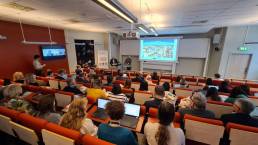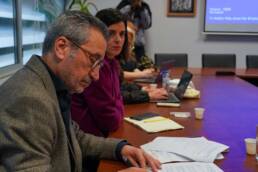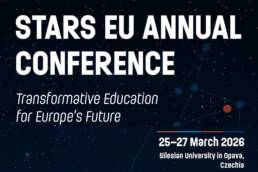The snowfall blanketed Trollhattän in the days leading up to the STARS EU launch event, which hosted the Swedish city’s academic institution, University West, as if it were a blank canvas for the ideas that would eventually flow during the two-day STARS EU launch event. From 4-6 December, around 100 people from the nine partner universities worked together in person to launch the activities of the eight work packages into which the partnership activity in the European Commission-funded project has been divided.
Although there has been a lot of work before that date, 1 November was officially the start date for STARS EU as a newly recognised European University, and this launch event served as a general framework for establishing the first steps in the different areas of the project.
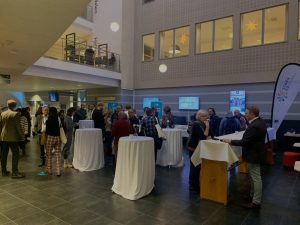 Of course, the intensive team-building sessions were complemented by a social programme that allowed for networking and also strengthening the links among the members of this alliance. And it seems that the objective was fully achieved, because at the closing session of the event, the most repeated words were “trust”, “good vibes”… and also “a lot of work”.
Of course, the intensive team-building sessions were complemented by a social programme that allowed for networking and also strengthening the links among the members of this alliance. And it seems that the objective was fully achieved, because at the closing session of the event, the most repeated words were “trust”, “good vibes”… and also “a lot of work”.
Welcome session
The Vice Chancellor of University West, Mats Jägstam, was the first speaker. He welcomed the guests from the other universities in the alliance and considered STARS EU a great possibility to be innovative and to compare and learn from other regions. He also considered it a “tool” to create good internationalisation at local level, and encouraged the attendees to take advantage of the good agenda of this conference and discuss “what to do and also what not to do”.
Anders Carlberg, Regional Development Strategist of the Västa Götaland region, gave a brief introduction of the importance of regional academic institutions, such as University West, for local development. He focused on two main aspects: the first was the regional smart specialisation strategies, highlighting areas such as sustainable industries, health and life sciences, food, bio-based materials and renewable energies, future mobility, hospitality and tourism and creative industries. The second priority he recalled was the development of competences, skills and lifelong learning.The Ingenium experience
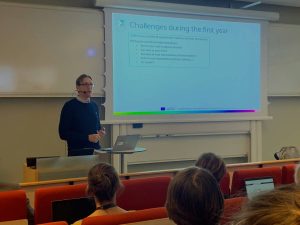
In the third speech of the morning, Mikael Ejdebäck, Deputy Vice-Rector for Internationalisation at the University of Skövde, explained the challenges faced and the work carried out during the first year of the Ingenium European University, led by the University of Oviedo (Spain) and of which his institution is a member. It was approved after its third attempt and officially launched in January 2023, with the participation of ten universities, eleven languages and 170,000 students.
Ejdebäck explained that, after the inaugural event of their alliance last January, they started working on the creation of the IT infrastructure, such as the website and the data repository. A schedule of two daily meetings of ten days each has been established, and the teams responsible for each work package started working on uploading the first mandatory deliverables.
During his presentation, he addressed some of the challenges that have arisen during this first year of activities: differences in internal organisation and recruitment procedures; the debate on whether it is better to hire new staff or appoint existing staff; deciding on students for local representatives; and gaining local visibility and good communication. Other challenges ahead include managing academic differences, sustainable mobility, joint degrees and finding ways to fund the partnership activities after the first year of activities.
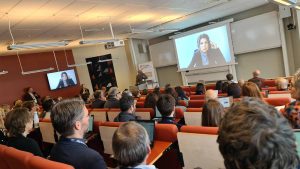
Antonela Giorgio, Project Adviser of the Education, Audio-visual, Culture Executive Agency (EACEA) of the European Commission connected from Brussels to explain her role to help the implementation of the alliance. He found really interesting to hear the previous speaker because he enabled her to hear not only the administrative problems, but the more practical ones. She emphasized the importance of having a good communication between the alliances with her agency and with other alliances as well.
STARS’ current situation
Finally, Rima Dijkstra, coordinator of STARS EU, gave a brief presentation of the whole four-year process that has led to the recognition, in July 2023, of the alliance as a European University in the open call of the European Commission. “Today we start a new chapter in our organisation. I am proud of the previous work because it has been the reason for our achievement”. The alliance was initially called Engaged and, after three attempts, on 1 November 2023 it started its journey as an official entity. At that point, STARS EU has became not only the alliance that it already was, but also a European project, which involves carrying out various tasks and meeting certain deadlines over the next four years.
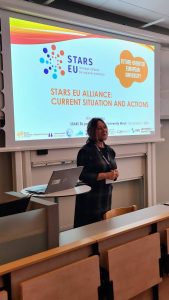
Dijkstra reminded some of the future challenges faced by STARS EU: the development of a campus, both digital (which was addressed two weeks ago during the Staff Week at Bremen University of Applied Sciences) and physical, which “will take a lot of agreements, but it’s the future”; long time sustainability of the alliance; to present projects in calls such Erasmus o Interreg; and to develop cooperation structures, among others.
Work packages
After the words of welcome and protocol, there followed two long teamwork sessions in the different work packages of the project, held during the afternoon of Tuesday 5 and the morning of Wednesday 6 December in different rooms of the West University. The leaders of each package coordinated these sessions, which have served to detect what should be the first actions to be undertaken in each of them and, in some cases, to establish timetables for their fulfillment.
While it is true that most of the alliance’s activities are carried out online, these face-to-face meetings allow issues to be discussed more directly and progress to be made in establishing objectives. As such, the alliance envisages live meetings where possible, the next of which will be the alliance’s annual conference, which this time will be held on 21-22 March 2024 at the University of Franche-Comté at Besançon (France).
Related Posts
February 6, 2026
Celebrate the International Day of Women and Girls in Science with STARS EU
The alliance demonstrates its commitment to full and inclusive participation of…
February 3, 2026
Bragança Polytechnic University and University West strengthen their strategic cooperation in research and doctoral training within STARS EU
The meeting addressed the implementation of joint doctorates and the connection…
January 30, 2026
Education to address new challenges, focus of the third STARS EU Annual Conference
The next event will take place in March 2026 at the Silesian University in…

